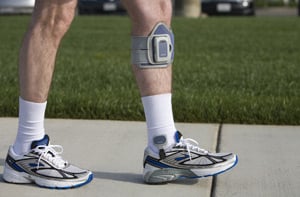
As Alfred Mann struggles to get the first product from his public drug developer MannKind Inc. approved, one of his smaller companies has received the Food and Drug Administration’s blessing this month to market its third medical device.
Bioness Inc., a privately held Valencia company, received approval for its second-generation wireless neurostimulation system, which increases the mobility for victims of strokes, multiple sclerosis, and traumatic brain or spinal cord injuries.
Historically, patients have relied on rigid plastic braces to walk, but they restrict thigh and ankle movements and can increase the risk of falling. Bioness’ first product, the Ness L300 unit, provides electrical stimulus to the lower leg, helping patients move their ankle.
The just approved Ness L300 Plus System adds thigh stimulation, giving patients control over their knees. The device is synchronized with a wireless heel sensor to detect when the foot is on or off the ground.
“It’s more than just a prosthesis device because it can actually help the user rehabilitate,” said Kim Schelble, Bioness marketing director.
The company’s other product is a forearm device to treat hand paralysis. None of the devices is cheap, with suggested retail prices of roughly $7,900. But Schelble said that with Medicare or private insurance, costs can be cut by 20 percent to 50 percent.
The company, of which Mann is majority owner, does not disclose revenues, but Schelble said that thousands of Ness L300 units have been sold since the device was approved in 2004. Research and development takes place in both Valencia and Israel, where the technology was developed and the devices are still manufactured.
MannKind Regroups
Meanwhile, Mann and other executive at MannKind said during a first quarter conference call that they expect new clinical trials to answer FDA concerns about the company’s Afrezza insulin inhaler device, which was recently redesigned. However, those trials may not be completed until next year.
Regulators decided in January that they wanted more extensive trials on the new, smaller design rather than rely on certain data that was gathered in studies using the original inhaler. The device would be the company’s first product.
MannKind narrowed its first quarter loss by 7 percent to $41.5 million as it cut its research and development costs. However, it reported 16 percent higher expenses, mostly due to severance payments related to laying off 179 workers, about 40 percent of its staff.
The company had $47.5 million in cash at the end of March, down from $70.4 million at the end of last year. Mann, who is chief executive of the company and its largest shareholder with 39 percent of stock, said his team is considering a variety of financing options to get them though the coming year.
“I remain committed to MannKind and I’m exploring ways to make moneys available. We are also studying several nondilutive as well as dilutive financing opportunities,” said Mann, who has loaned money to the company in the past as well as taken larger equity stakes.
Derycz’s Growth Continues
When drug companies need copies of a medical journal article to promote a new drug, Derycz Scientific Inc. is working hard to make sure it’ll get the call.
The Santa Monica company has found a growth business by providing archival scientific literature in both printed and electronic form. Efficient execution of that strategy has almost tripled the company’s stock price compared with a year ago. Shares, which trade over the counter, closed at $2.63 on May 26.
Revenue in the most recent fiscal third quarter, which the company reported this month, rose 23 percent to more than $7.6 million. Derycz reported a $1.5 million loss, compared with a year-earlier profit, primarily due to an accounting change.
Chief Executive Peter Derycz sees his company as a superaggregator that eliminates the need for a customer to do research and reprint work themselves. Customers get access to an enormous database of articles and several delivery options.
While one company might want a few copies of an article delivered to key scientists, another may require tens of thousands of copies sent via e-mail to doctors before a medical conference. Derycz the company handles the logistics, while also negotiating publisher and copyright issues. Most of its customers are drug makers or medical device manufacturers.
“Like Amazon, we stand between the publishers and the consumers,” Derycz said. “We make sure documents are flowing one way and dollars are flowing the other way.”
The company foresees additional gains from the acquisition of a European competitor. The all-stock deal to buy Techniques Appliquees aux Arts Graphiques, a reprint company outside Paris, is expected to increase revenue by about $1 million per month, a 50 percent increase from preacquisition levels. The deal closed in April.
Staff reporter Deborah Crowe can be reached [email protected] or at (323) 549-5225, ext. 232. Staff reporter Joel Russell contributed to this story.
